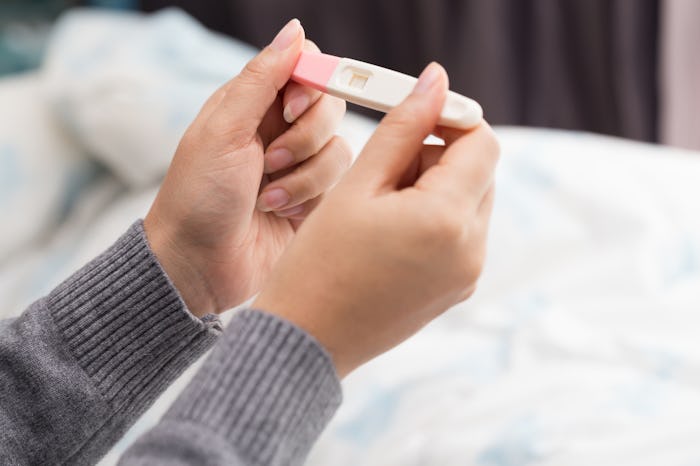Life

An Expert Weighs In On The Best Time Of Day To Take A Pregnancy Test
In our "just Google it," two-day shipping world, it's hard to wait for results. So when you decide you're ready to get pregnant, nothing is harder than waiting to see if it worked — you want to take the at-home test as soon as possible. If it's negative, you think, "maybe I tested too early" or "perhaps I didn't do it under the best conditions." Hoping to get a positive result the second time around, you're probably curious — what time of day should you take a pregnancy test? Experts say you don't have to rearrange your schedule before peeing.
"There is no 'best time of day' to take a home urine pregnancy test," Adrienne Zertuche, OB-GYN at Atlanta Women's Healthcare Specialists, tells Romper. "Your urine’s level of beta-HCG (the pregnancy hormone) does not fluctuate throughout the day, and the ability of the test to detect beta-HCG is unlikely to be affected by the concentration of your urine." So while you may have heard that first thing in the morning is the best time to test, there is no advantage to testing during your first bathroom break of the day. Whether you take the test on your lunch break, after you get home from work, or in the middle of the night because you're too anxious with anticipation to sleep — the results will be the same and as accurate as possible.
While time of day isn't important, the date you test on does matter. According to Zertuche, "The most important aspect of 'timing' for a pregnancy test is when you take the test relative to when you expect to get your menses. Whether you are trying to conceive, or whether you are not ready for a child but had a condom mishap and could not access Plan B, I do not recommend taking a home urine pregnancy test until at least one to two days after you expect your menses to start." This can be challenging if your period is irregular, or your body is still adjusting after years of being on the pill. Keeping track of your cycle or charting your fertility can help give you a clue as to when "Aunt Flo" is due to arrive.
If you do end up disappointed by a negative test, it's not crazy to hold out hope. Zertuche explains that "the most common cause of a falsely negative pregnancy test is one that is taken too early. Home urine pregnancy tests are variable in their ability to detect beta-HCG, and this hormone starts off at a very low level and rises over time. If your test results are negative, but you continue to suspect that you might be pregnant, you should repeat the test in one week." Yes, you will spend that week in agonizing suspense, but if you're rewarded with a positive result, you'll soon forget how hard it was to wait.
Although my oldest is about to turn 4, I still remember some of the anxiety and impatience I felt during the year it took me to get pregnant. I felt like I had waited for the time in my life when I was ready to have a child, so why did I have to wait any longer? I obsessed over all the details of timing, and took more than one test each month, hoping that the first negative was only because I'd tested too early. What I don't remember anymore is the timing of the positive test — was it a few days after my missed period or a week? These details that are once so important lose their vividness as they are replaced by the details of your pregnancy and delivery — the stories you will tell your children for years to come.
Check out Romper's new video series, Romper's Doula Diaries:
Check out the entire Romper's Doula Diaries series and other videos on Facebook and the Bustle app across Apple TV, Roku, and Amazon Fire TV.